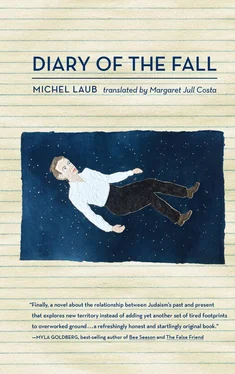10.
My father used to say that Jews should always choose professions that can be practiced in any circumstances, because from one moment to the next you could be forced to leave the country where you’ve always lived and you can’t rely on a language that isn’t spoken anywhere else, or on a knowledge of laws that don’t apply anywhere else, that’s why it’s good to be a doctor or a dentist or an engineer or a tradesman, because that will guarantee you an income regardless of what the neighbors may say about you, and they’ll say what people will always say about Jews, that you steal other people’s jobs, that you lend money at interest, that you exploit, plot, threaten, oppress.
11.
I studied law at university, then went into journalism, and then became a writer, by which time my father had stopped staring at me, eyes bulging, as he tried to convince me that we were still in the Germany of 1937. When I was thirteen it was different, and because he wouldn’t accept my decision to join João at the new school, because he refused to discuss the matter whenever I brought it up, because our arguments became so fierce that I was permanently grounded, with me telling him that I wouldn’t study at all next term, that I would run away from home if he didn’t change his mind and that he had a deadline by which to make a decision, the date on which enrollment at João’s new school closed, for all those reasons I began to hate everything to do with Nazism and my grandfather.
12.
My father had my grandfather’s notebooks translated because he needed a record of those memories, and because he was the only one who would be interested, a son reading the description of his own birth in his own father’s words, my grandfather saying that the birth of a child crowns a husband’s decision to seal his union with his wife , and that there is no happier event in a man’s life than the day he accompanies his wife to the hospital to give birth to a child .
13.
My grandmother’s pregnancy was high risk. She suffered from hypertension and had a problem with her cervix. It was fairly common at the time for there to be complications, deaths from eclampsia or a hospital infection picked up immediately after giving birth were far more frequent, and little was known about the effects of diabetes and heart problems and smoking and viruses on the health of the pregnant woman. The way people reacted to such risks was also quite different: it wasn’t uncommon for a pregnancy to be terminated for fear the mother’s life might be in danger, and my grandfather’s descriptions of the time are all imbued with that subtext, what to do with my grandmother when the doctor recommended that she should spend the final months of her pregnancy at home, in bed if possible, without getting up and preferably without moving.
14.
What decision to take about a pregnancy that could have killed my grandmother? What did my grandfather say to her when he found out about this risk? How did my grandfather deal with the matter, what words did he use to express his wish to have a child at that moment, what did a child mean to him, would he be capable of devoting himself to a child, and because of that child forget about the past and all the dreadful things he had seen and suffered because of it?
15.
The same notebooks that describe a public baths in the center of the Porto Alegre of 1945 as a place where the most rigorous hygiene regime flourishes , a butcher’s shop attached to a poultry slaughterhouse in the Porto Alegre of 1945 as a business where the animals are treated according to the most rigorous of hygiene regimes , a kennel in the Porto Alegre of 1945 as a place where the animals are treated according to the most rigorous and humane of hygiene regimes , those same notebooks say that the decision to go ahead with my grandmother’s pregnancy was taken without hesitation and speak of the expectation of a new life that had long been planned by the husband and of his profound desire for continuity and a loving, giving relationship .
16.
Hospital — a place where doctors patiently explain to the pregnant woman the very low degree of risk involved in any pregnancy and the equally low risk involved in having a Caesarean and the nonexistent risk of infection after the birth given the hospital’s rigorous hygiene procedures which extend to the bathrooms with hot running water and to the toilets, which are cleaned every hour, and to the care assistants who apply these rigorous hygiene procedures throughout the day, using disinfectants, sterilizing agents and quarantine. There is nothing at the hospital that need trouble the husband of the pregnant woman, whose child will put the seal on the continuity of their loving, giving relationship should he choose to walk down the corridor alone or go home in order to be alone .
17.
My grandfather continues to discourse upon the ideal baby, how to care for the ideal baby, the father’s relationship with the ideal baby, a small autonomous creature who never cries at night and never contracts diseases such as hepatitis or the common cold , and the truly alarming thing is that he filled sixteen notebooks, measuring twenty-eight centimeters by nineteen, each with nearly one hundred pages, each page having thirty-one lines, filled with a prose that leaves no doubt as to how my grandfather dealt with his memories.
18.
My father was born at five o’clock on a Monday afternoon, but I don’t know if the day was sunny or gloomy, cold or hot, dry or humid, because my grandfather doesn’t bother to mention it. My grandfather filled sixteen notebooks without once saying what he felt about my father, not one honest, open remark, not one word of the kind one usually finds in the memoirs of concentration camp survivors, about how life goes on after you leave a place like Auschwitz, the renewal of hope when they have a child after leaving Auschwitz, the rediscovery of joy on seeing that child growing up like a riposte to everything they saw in Auschwitz, and just the horror of knowing that someone survived Auschwitz only to waste all their free time on that sterile enterprise, on the pointless, inexplicable exercise of imagining every real phenomenon as something to be transformed into its exact opposite, to the point that all defects, all features disappear, along with the characteristics that allow those things and places and people to be appreciated for what they really are, that horror must somehow be related to Auschwitz and to the way in which my grandfather always behaved toward my father.
19.
I’ve never asked my father what memories he has of his childhood, if my grandfather sang the lullabies that Jewish parents used to sing to their children before Auschwitz was built, if my grandfather embraced him as Jewish parents used to embrace their children before Auschwitz was opened, if my grandfather defended him as Jewish parents throughout history used to defend their children before Auschwitz was functioning at full capacity, because that is what a father does for a child, he protects and teaches and showers him with affection and with physical and material comforts, and the way in which my father dealt with the subject of Judaism and the concentration camps must, in some way, be connected to those memories — how he related what he saw and knew and felt about my grandfather with what he read and knew and felt about Auschwitz.
20.
It’s difficult to say what my first memory of my father is. It’s possible that you associate a smell or a taste or a sensation of warmth with the evocation of something you would have no way of holding in your memory, as if you were looking at yourself from the outside, in a cradle beside your father’s bed, and you talk about it because it’s a relatively common scene, and innumerable emotional and cultural references mean that the initial relationship between father and baby should, in some way, be linked to that scene, the cradle and the blankets and the smile of someone whom you sense or know is as close to you as anyone can be.
Читать дальше












